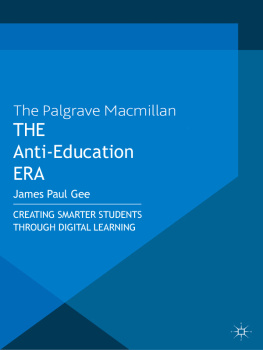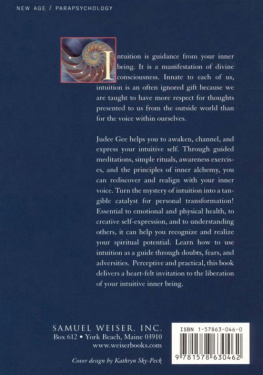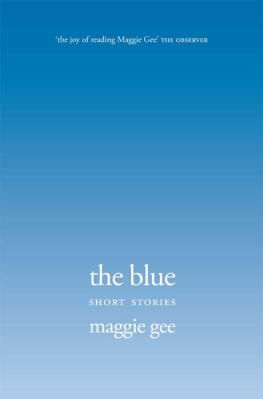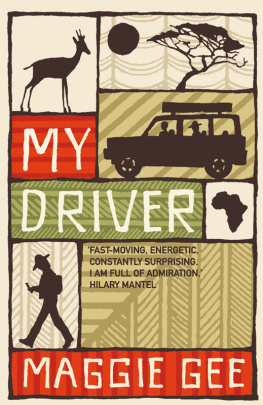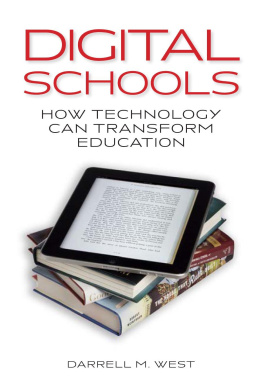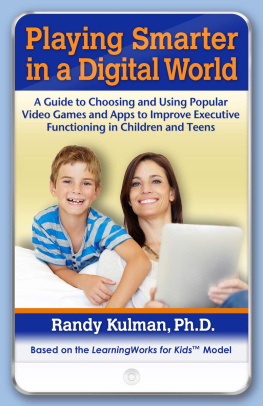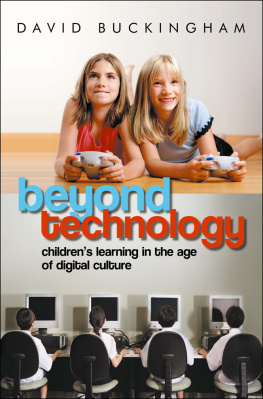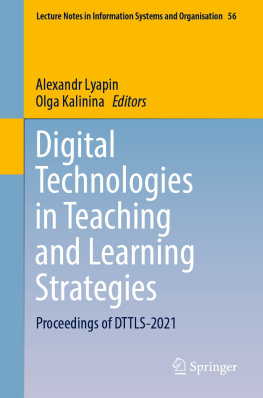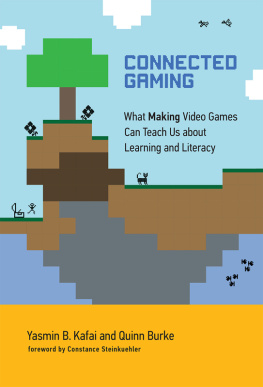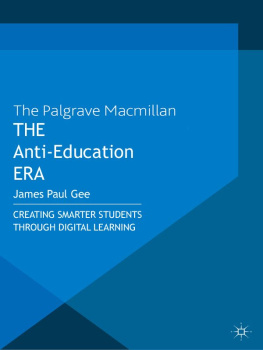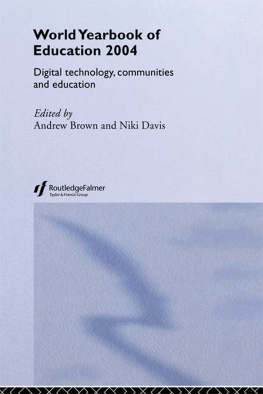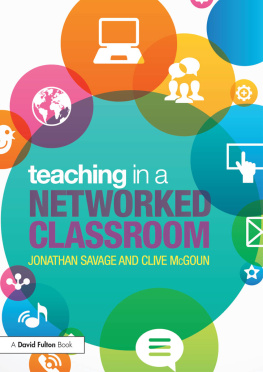THE
Anti-Education
ERA
Also by James Paul Gee and available from Palgrave Macmillan
What Video Games Have to Teach Us About Learning and Literacy
Women and Gaming
THE
Anti-Education
ERA
CREATING SMARTER STUDENTS THROUGH DIGITAL LEARNING
James Paul Gee

To the Nine: Bandit, Bene, Bolt, Conrad, Harley, Micah, Muffin, Rolle, Witten.
And to the One and Only: Bead.

THE ANTI-EDUCATION ERA
Copyright , James Paul Gee, 2013.
All rights reserved.
First published in 2013 by PALGRAVE MACMILLAN in the United Statesa division of St. Martins Press LLC, 175 Fifth Avenue, New York, NY 10010.
Where this book is distributed in the UK, Europe and the rest of the world, this is by Palgrave Macmillan, a division of Macmillan Publishers Limited, registered in England, company number 785998, of Houndmills, Basingstoke, Hampshire RG21 6XS.
Palgrave Macmillan is the global academic imprint of the above companies and has companies and representatives throughout the world.
Palgrave and Macmillan are registered trademarks in the United States, the United Kingdom, Europe and other countries.
ISBN: 978-0-230-34209-5
Library of Congress Cataloging-in-Publication Data is available from the Library of Congress.
A catalogue record of the book is available from the British Library.
Design by Letra Libre Inc.
First edition: January 2013
10 9 8 7 6 5 4 3 2 1
Printed in the United States of America.
Preface
AFTER MANY YEARS OF STUDYING PEOPLE I HAVE become intrigued, as have many others, by how a species named for its intelligence (Homo sapiens: wise or knowing man) can sometimes be so stupid. Depending on how you look at it, humans are either marvelously intelligent or amazingly stupid.
We build great cities in the desert, cities like Los Angeles and Phoenix. Then we waste and pollute the deserts already short supply of water. We pour concrete on the ground and spew carbon into the air to make the heat of the desert ever hotter.
We wage vast public health campaigns to save poor people across the world from infectious diseases. Then we kill lots of them in endless wars.
We know how to make some people richer than whole countries, people like Bill Gates, Warren Buffett, and six members of the Wal-Mart Walton family. Then we leave whole countries to starve.
In the United States, many people take the moral high ground on abortion and the sanctity of human life. Then they let a great many children and adults suffer or die in the United States because they have no health care and across the world because they have nothing to eat.
We use our financial genius and newly minted MBAs to create amazingly complex new financial instruments like derivatives and credit default swaps. Then we use them as financial weapons of mass destruction and devastate the global economy. We go on to reward those who brought on this vast destruction with bailouts and bonuses rather than punish them with jail terms.
We spend over two hundred years creating a vibrant two-party system capable of solving problems like going to the moon. Then we mire our politics in ideological and cultural debates just at the time when we face major global economic, environmental, and civilizational problems that could bring on Armageddon, problems that demand pragmatic, not ideological, solutions.
We create military technology that is the envy of the world and capable of great shock and awe. Then we manage to wage two massively expensive and not all that successful wars in Afghanistan and Iraq and go on to decry our massive federal deficit.
We create marvelous new digital media that bring people more information about and more perspectives on the world than ever. Then people customize their media to the point where they live in filter bubbles and echo chambers where they never need hear anything they dont already agree with.
We discover the magic of how to turn plants into fuel (biofuel). But then, in a world where lots of people are starving, we actually make fuel out of food like corn, raise the price of food, and starve the poor yet more, which is all a bit like Midas turning food into gold. Perhaps we will be smart enough eventually to make fuel out of fungus rather than corn.
Humans have, of course, always been really smart and they have always been really stupid. Early human groups learned to cut down trees and hunt animals and then they sometimes cut and hunted the trees, animals, and themselves into extinction. After all, if the Native Americans had not killed off all the New World horses, they would not have been easy prey for the Spaniards on their Old World horses.
But the problem of us humans being a dumb smart species today is different: our human intelligence has now created a highly complex, fast-changing, and very risky world. The cost of mistakes in this world is now often way too high for individuals and whole societies to bear. In a fast-changing global world replete with complex interacting systems, human actions can bring on all sorts of disastrous unintended consequences. Viruses take rides on jets along with humans; a new Wall Street financial product wipes out economies throughout the world; jobs float to the lowest cost centers in the world, shuttering whole towns and cities in the United States; economic collapse and global warming send hordes of poor immigrants across the globe.
In a developed country like the United States, where inequality is high and there are a great many poorly paid service jobs, but not all that many highly rewarded knowledge production jobs, people face a wealth of high-risk decisions. What is worth knowing? What skills are needed for a fast-changing world? Does real education happen in school or out of it? How much of a childs fate is already determined by what has happened at home before school? How can one prepare for massive and unpredictable changes in the world? How can we keep the trains of our polarized politics, vast worldwide disparities in health and wealth, massive flows of money crisscrossing the globe as mere numbers in computers, and out-of-control environmental problems from running off the cliff?
As developed countries like the United States and emerging economies like China and India use up and pollute the worlds resources, how will they face the massive flows of immigrants and worldwide wars created by shortages of water, food, and human dignity? How will developing countries ever enter the modern global economy when resources are scarce, corruption is rampant, and the developed world is awash with deficits and ideological conflicts?
Where is new thinking going to come from in a world polarized by ideology, religious conflicts, and vast degrees of inequality? We humans today have the best tools we have ever hadthanks to technology, digital media, and social mediato be smart. But these tools will not make us smarter all by themselves. Indeed, in many ways today, they are making us dumber. We need to change who we are as humans. We need to respect Mother Nature. We need to find the seeking of evidence as sexy as the trading of ideology. We need to innovate before it is too late. We need to make more people count and let more people participate.
But in this book I am not primarily interested in the fate of society and the world. That fate is too big to think about all at once. I am primarily interested in my fate and the fate of my children. I am primarily interested in your fate and the fate of your children. This is not a book about policy and statistics. It is a book about us, about you and me. It is a book about why it might be important for us to save ourselves from our own stupidity. It is a book about what sorts of creatures we humans are and how we can become better ones.
Next page
